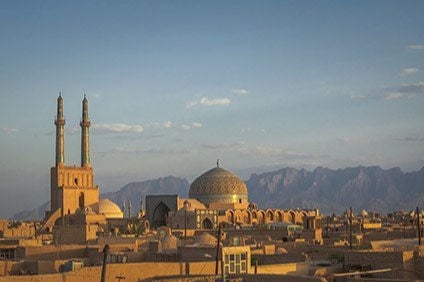
Iranian automotive suppliers are strongly optimistic they will secure joint venture deals with Western partners, as decades of pent up energy are poised to uncoil with the lifting of international sanctions against Tehran.
Iran has the capacity to be a 2m vehicle market, but around half of this remains unused as severe economic and political opprobrium has rained down on Tehran for the past few decades, in response to what the West perceived as a steady march towards enriching uranium for nuclear weapons.

Discover B2B Marketing That Performs
Combine business intelligence and editorial excellence to reach engaged professionals across 36 leading media platforms.
Years of tortuous negotiations by the P5+1 negotiating group: UK, France, Russia, US, China plus the non-permanent Security Council member, Germany and Iran, have finally led to the imminent removal of sanctions, although they have yet to pass a significant rump of sceptical US Republicans potentially anxious to derail any deal.
But momentum appears to be with those brokering an agreement to be inked potentially as early as January end and which could ensure Iran becomes a beacon of stability in a roiling Middle East – with auto suppliers queuing up to secure a piece of the economic action.
France has been particularly active in courting Iran’s automotive sector, with its main companies of PSA Peugeot Citroen and Renault having associations with domestic producers, while Scandinavian supplier body, FKG also recently led a visit to the country with several regional component makers.
“Sanctions have made a lot of limitations for us – we believe many difficulties and problems will be resolved and parts manufacturers will improve their supply [once they are lifted],” Iranian Auto Parts Manufacturers Association (IAPMA) CEO, Sasan Ghorbani told just-auto, emphasising the collaborative nature of any future business.
“Government policy is to support joint ventures and European companies have greater chance – in my point of view many cooperation agreements will be signed. Most European companies and related associations are waiting for sanctions to be lifted with this in mind that mutual cooperation will expand.”
France and Scandinavia have been first through the auto component door, but the Iranian supplier body CEO did not rule out working with British and American companies, an almost unimaginable scenario until only recently.
“We believe UK and US possess fine automotive and parts manufacturing industries and we can make a good cooperation with these two countries, especially in technological parts,” added Ghorbani.
“High-tech parts and components are our principal problems. Iran has great infrastructure; but sanctions caused us to lag behind [the] advanced automotive world in technological fields. But lifting sanctions can compensate for this problem.
“For the moment more than 200,000 employees work directly in [the] auto parts industry and this number could increase by increment in car manufacturers’ production volume.” [should sanctions ease]
Interestingly, Ghorbani noted while the plunging oil price, which some speculate could sink to as low as US$15, is undoubtedly causing pressure on Iran’s coffers, it was also a potential jump start to supplier localisation, much in the same way Russia’s component makers are taking advantage of a sinking ruble.
“Falling oil price confronted Iran’s economy with lots of problems,” said Ghorbani. “This reduction could be considered also a threat and an opportunity.
“We have to [have] lean localisation and domestic production – and cease dependency on oil revenue.”
The supplier chief added demand for car purchases had fallen in Iran as the sanctions screw turned, but dropped a heavy hint the environment would pick up once restrictions were lifted.
“Waiting for prices to decrease is one of the most important reasons for this matter,” he noted.
“According to me this situation will sustain roughly for one year. But things will get better.”






